|
The Hyderabad that we were leaving, now in the mid-morning, was a bustling and congested place, transformed from the sleeping city we had entered. But no amount of traffic could contend with our muscularly armed escort, which Andrew and I continued to watch in amazement as we continued on the highway north toward the shrine of Shah Latif. To enter a Sindhi town, even by car, is to be enveloped by it. Depending on your mood, it might feel that you are being embraced or that you are being swallowed. Leaving the highway deposits you onto a narrower road, which nonetheless bears streams of traffic in different directions. Storefronts and houses cling close to the side of the road, and against them vendors and stalls cram themselves, filling all possible space. At times your car moves freely, but just as often you are sharing the road with a herd of water buffaloes, and they won’t easily yield the right of way. And so it was as we entered Bhit Shah. The street that leads toward the shrine is itself a marketplace, full of village treats, carts full of nuts and sugary brittles and salty snacks that looked like popcorn but must have been something different. Banners were strung to form a loose canopy overhead. Half of these were red banners with the axe-logo of the Sindhi Nationalists, who want to separate from Pakistan and form their own country. But intermixed with those were the red-black-and-green banners of the Pakistan People’s Party, the party of the Bhuttos, which had at one point been Sindh’s deepest stake in the federation of Pakistan. One banner represents a hatred of the state of Pakistan, and the other represents a wish to rule within that united state. It seems at least to my still-learning mind that these forces are fundamentally opposed. But here in Bhit Shah, strings of these two banners hung together as if there were no political tension in between them. At a certain point the road simply seemed to end, at least as far as motor vehicles were concerned. I realized then that we had arrived at the shrine itself. As we left the car, our security guards gracefully fanned out around us in a formation so as to leave none of our corners unprotected. One of them, who seemed to be their leader, judging from his dignified bearing, stayed with us, talking with Faisli in Sindhi. We walked up a few stairs and then paused to take off our shoes. I checked to make sure that my dupatta was wrapped firmly over my head. 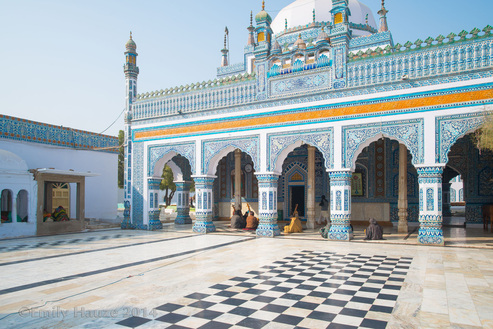 Threshold of the Saint: The Shrine of Shah Abdul Latif Bhittai. Threshold of the Saint: The Shrine of Shah Abdul Latif Bhittai. A few steps further inward and we were in an entirely different space, where that busy marketplace at the bottom of the stairs seemed foreign. The inside of the shrine is its own world, a surreal place, bright and yet hushed and calm. Outside the door of the tomb sit a group of sufi musicians, who devote their day to singing songs written by their saint, Shah Abdul Latif Bhittai. On this morning there were five of these musicians, each sitting in a lotus position. Each musician’s lap cradled the round belly of a tamboora, whose long neck extended up over the musician’s left shoulder. The tamboora is a plucked string instrument, a kind of lute, and it is notable for being the instrument of Shah Latif himself, even invented by him, according to legend. And who is this Shah Latif? My Sindhi readers will know the name as if it were their own grandfather, or something more than that, their Shakespeare, their guide, their role model. But Westerners, particularly Americans, will not have even heard of him. And for those readers, I can only give you a faint sense of how important this poet-saint is for Sindh. He was the first great poet of the Sindhi language in a time before the Sindhi language had been formally codified in writing. He lived from 1689 - 1752, which, incidentally, makes him an almost exact contemporary of the composer J. S. Bach. Latif was a learned man, a traveler, and is remembered to have been highly virtuous as well as ascetic. His great epic, the “Shah jo Risalo” (translated in one print edition as “The Message of Shah”), recounts the ancient legends of Sindh, many of them tragic romances focused on their heroines, in poetic form. And I have been told by many of my most educated and well-read Sindhi friends that Latif’s poetic excellence is no less than Shakespeare himself. My own grasp of Sindhi is still far too weak to make that judgment for myself, but I can attest that Latif’s words flow more deeply in the hearts of Sindhi people than I have ever observed anywhere else, with any other master of verse. So that is the man whose tomb is enshrined in Bhit Shah, with this mystical checkered courtyard and finely painted pillars and mood of utter quiet. I don’t know how it is possible that I could have a sense of silence in this place, when in fact the five musicians were raising their voices in ecstasy almost without interruption. Somehow both things exist at once there: silence and sound. 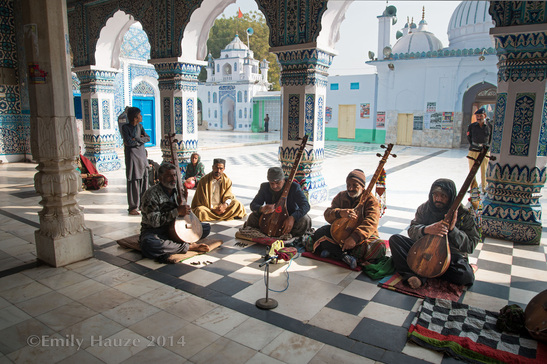 Minstrels of Latif. And, the leader of our security team, at the left. Minstrels of Latif. And, the leader of our security team, at the left. And a beautiful sound it was. A plaintive solo voice would intone a verse and then be joined by the ensemble in a united chorus. I knelt down and sat with them for a few minutes. Andrew placed some rupees on their blanket as an offering, and received a black string bracelet in return, along with a heaping handful of small round candies, rose-flavored. We paid our respects to the tomb of the saint and let the atmosphere surround us for only a moment -- though I would gladly have spent the day there. But it was time to go. Faisli reminded us of the schedule. And from this point we also had expected our security guards to leave us, since they had only agreed to escort us as far as Bhit Shah, from which point they could easily drive back to their home base in Nawabshah. The head guard was still talking to Faisli, though; they were discussing something. As we got back in the car, Faisli told us that the guards would stay with us all the way to Larkana. It was quite a long way out of their way -- many hours out of their way, in fact -- but they wanted to stay with us. Perhaps they had been moved by the way we admired the shrine, I’m not sure. Perhaps they were surprised by the wonder on our faces. But something had moved them to stay with us, and I was beginning to feel a kind of emotional connection to them. A kind of kinship. This is something that happens in Sindh--kinships are created of all kinds. They simply happen. It happened to me even across 8000 miles, from which distances I had made all my Sindhi Facebook friends to begin with. And in Sindh itself, it happens at every turn. And it isn’t just me -- Andrew also found that he very quickly bonded with people in Sindh, especially our Sangi relatives, in a genuine way of the heart. On this first day, it was already happening on different levels, with our Sangi brothers, with our guards, with people we saw just for moments. But back to the schedule. Our vehicles again nudged their way out of the arms of Bhit Shah and back onto the highway, now headed toward the town of Sehwan. We had divided Andrew’s rose candies amongst ourselves. Then Faisli reached down to a bag at his feet and revealed that papa Saeed had sent along a bundle of food for us to munch on during the drive. “He couldn’t let his beti go hungry!” smiled Faisli. In truth we were not hungry, but we at least contemplated the bag's contents as we continued down the road. Meanwhile, of the four bouquets of roses that had been stuffed behind our heads scented the air, occasionally reminding me of their sweetness when the fragrance caught the breeze. After a while we again left the highway, and our car was elbowing its way into the narrow streets of the town of Sehwan (pronounced in a way very similar to the number ‘seven’). Our police escort naturally attracted attention, and many curious eyes were peeping into the windows of the car to try to figure out who we were. Andrew was sitting in the front seat, partially disguised by his mustache (grown specially for this trip to blend in with the locals), and some of the townspeople saluted him, thinking perhaps that he was a dignitary or wadera (landlord). Those who saw me in the backseat probably figured out that we were foreigners, but their attitude was never hostile--only curious. 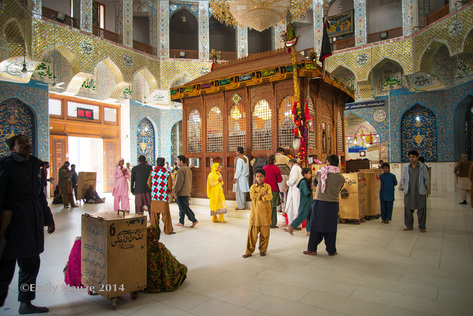 Interior of Qalander's shrine. Interior of Qalander's shrine. It was sunny and sandy at the spot where the car parked, near the shrine of St. Qalander. Flies buzzed in the air. Once again our guards fanned out into their practiced constellation around us, and we stepped onto the marble floor of the expansive courtyard outside the shrine. It was a little after noon, the brightest time of day, and the shrine’s golden dome was gleaming opulently. 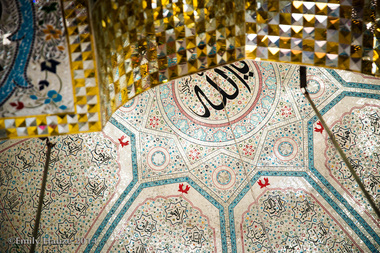 It is a larger and more ornate shrine than the one at Bhit Shah, and despite similar architecture it is a completely different experience. At Qalander one is more aware of the uneasy cohabitation of luxury and poverty. The building itself is gorgeous, with that glowing gold dome, and an interior glittering with thousands of inlaid mirror tiles that radiate out from the words “YA ALLAH” at the center of the ceiling. My pictures from inside the shrine, taken all too hurriedly, cannot do justice to that awe-inspiring space.
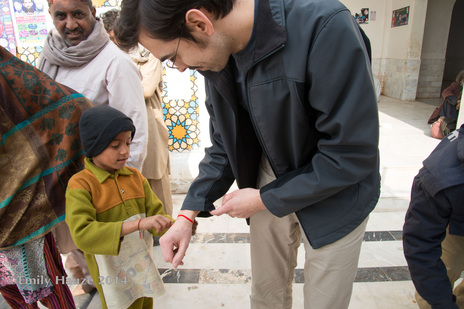 Andrew and the cherubic beggar boy. Andrew and the cherubic beggar boy. The boy followed us at a distance of maybe ten paces, still smiling at us like a cherub. We scrounged in our pockets for a bit of money to give him, and he trotted off contentedly. I wish I had stopped long enough to ask him his name, which is one of the few Sindhi phrases I could have actually managed at the time. We were nearly at the car, and for the most part the guards had been able to discourage more beggars from approaching us. One woman was more persistent though, and she has imprinted herself on my memory. She was small and of thin frame, carrying a big, naked baby who seemed to be half her size. Her tactic for begging was not charm but intimidation. I couldn’t help but meet her eyes as we passed, piercing eyes, full of anger and deprivation. I couldn’t understand any of the words she spoke, so I couldn’t tell if she was just lamenting her need or actively cursing me for my privilege. It certainly felt like the latter. As we drove away, at a snail’s pace due to the congested roads, this woman followed us, slapping her palm against my window. Faisli could sense that I was distressed. “If you gave her money,” he said, “then all the other beggars would be doing the same.” And he was right -- yet I could understand that woman’s anger as well, and I will not forget her. Eventually we rolled out of Sehwan and back onto the highway. We were now done with the day’s sightseeing, and what remained was the long road to Larkana. Faisali and Fahadi soon slumped into a sleepy heap on their side of the back seat and dozed the rest of the way. Andrew and I were awake for a lot of the journey, still charged with excitement and amazement at our surroundings. We marveled at the scenery, the dusty deserts, and the surprising chalky mountain range that materialized at our left side. Eventually I did close my eyes, but rest still eluded me. After a few hours my phone rang--not my American phone, but a special Pakistani phone that Faisli had given me first thing at the airport. Periodically papa Saeed had been calling and texting to this number already. Now he was calling to find out how close we were to Larkana. I woke Faisal up and put him on the phone, and after shaking the drowsiness out of his head he was able to report that we were just half an hour out of the city now. Hanging up, he told us that Papa was coming in his car to meet us outside the city. And sure enough, after a few more minutes, our taxi pulled over to the side of the road, and there was the familiar shape of Papa-plus-camera: his enormous zoom lens extending from his face, having already documented our arrival with photos. As Andrew and I got out of the car, papa handed the camera off to someone--maybe one of the guards--and rushed towards us with another bouquet of roses for each of us -- making bouquets # 5 and 6 for the day. And he also had two long strands of roses, garlands, which he proceeded to drape over our shoulders, while photos were snapped. And he gave us great bear-hugs of the sort that only papas can give, and welcomed us to our home. This was our papa whom we were meeting in person for the first time in our lives -- and our home in which we had not yet ever set foot -- but it was a true homecoming. “Now you are coming in MY car!” said Papa, assuring us also that all our bags would be brought in from the other car by someone else. I was so tired at this point in the journey that my memory becomes blurred. It was late-afternoon, nearing sundown. As we drove those last minutes into Larkana and toward the Sangi house, papa was cheerfully pointing this out in the scenery--mostly birds. “There! .. is a dove…. and you see sweet EM… there is the bee-eater…” and giggling. And Papa’s giggling is infectious, even when you’re exhausted. When we reached the Sangi house, Papa honked his horn several times, and the black iron gate was opened. Inside were a throng of Sangis, at least a dozen smiling faces, many of them unfamiliar to me. I did recognize my immediate Sangi siblings right away, as well as Ammi (our mother), but there were many more people here, too. Over the coming days I would get to know all of them and rapidly come to feel close to many of them--but on this first day I wasn’t able to absorb much else. After this smiling chaos of introductions we were brought to our room, which I will describe more in the next blog entry. Our intention was just to rest for a couple of hours and then come down to the first of my sister Marvi’s pre-wedding celebrations, a big party called a “wanwah.” And indeed I had every desire to revive myself for that party--but my feeble constitution would not allow it. After washing myself up a bit and then shivering inside a blanket (houses are not heated in southern Pakistan, because there’s hardly any need, but this means that winter nights can become chilly), I could tell that I had reached the end of my energies, and needed much more time to recover. So we apologized profusely to the many celebrating Sangis, vowing to be our full selves for the other three celebrations yet to come. And that was the end of what was possibly the fullest day of my life. But each day that followed brought new and different adventures, which I am eager to share with you. The next entry will begin again in the early morning, with sound of Sindh as it wakes for prayer. Below is a slideshow of my photographs, some of which are duplicates of the above, plus some additional ones that help to tell the story.
17 Comments
naz sahito
1/21/2015 03:52:09 am
This part of your travelogue is more intresting because it connects readers with AaShah Abdul Lateef Bhittai,your brief observations and introductions of Shah Lateef and Qalander Lal Shahbaz are very informative.You are right while noticing the importance of Bhittais poetry,s importance in lives of Sindhi people across the globe is as a constitution for life.Scenes narated by you at shrine of Qalander are hard reality of the land ehich is mostly badly governed.Your way of writing is introducing peoples a news Sindh,as you have narated the sitting of Shah ko rag,this music institution is more than 300 years old institution...Now your travelogue is luring more intensity fir readers.
Reply
Emily
1/26/2015 10:33:36 pm
Really glad to read your comment, Naz. This entry is certainly the most important of the ones I've written so far.
Reply
1/21/2015 04:04:35 am
I love the integrated pictures and the image of silence and sound.
Reply
Rustam Mirjat
1/21/2015 04:07:13 am
Very good write up
Reply
1/21/2015 04:23:07 am
The Shah Jo Risalo or the Message of Shah is now available for the western audiance in print and electronic form at authorhouse.com, amazon.com as also barnesandnoble.com, under the title "Mystic Melodies/Shah Abdul Latif Bhittai".
Reply
Dr Khalid Hussain Laghari
1/21/2015 01:24:19 pm
Feel very pleasure to read your blog about the visit of Sindh, especially the way you describe the Bhitai and Qalander.
Reply
Every Sindhi will tell you that Shah Latif is better than Shakespeare. I once tried to find a sense in this claim in an online course of Duke University. I wrote a brief case study on Shah. Here's the link:
Reply
Emily
1/26/2015 10:28:56 pm
Hi Fizzy -- I actually hadn't seen this comment of yours before right now. I tried to go the link and it didn't work -- would you repost, or send it to me by email? Thanks
Reply
1/22/2015 12:54:05 am
Its an honest account of things you saw at the places you visited. My liking to your writing style has turned to a type of respect now. You have not hesitated in giving true and honest words in the shape of comments to your observations. I am really impressed. Its a well written piece literature to me. Eagerly waiting for the next part of your travelogue. Wish you and Andrew all the best.
Reply
Emily
1/22/2015 01:38:16 am
Thanks so much for your kind and generous words, my friend.
Reply
dr ghafoor magsi....neurologist....!!!!!
1/22/2015 04:06:51 am
Superb my dear Emily...........
Reply
Majeed Thahim
7/21/2015 08:57:20 pm
EM! I utilized my Eid holidays to read your Sindhi travelogue and surprised that how beautifully you have articulated the stories of Sindh visit. Let me read more because your write-ups have increased my thirst of reading. I would suggest that plz compile a book of your write-ups, which would be a real tribute to Sindh especially Sindhi people.
Reply
Emily
7/22/2015 02:32:44 am
I'm so pleased to read your comment, dear Majeed! Thank you for those words of encouragement. I do hope that my travelogue can become a book some day. Smiles :)
Reply
1/29/2019 11:09:51 pm
Superb! such a nice blog! This webpage provides useful data to us, keep it up. I had been looking. Regards <a href="http://alamaldubai.com/gypsum-partitions-dubai/">Gypsum work contractors dubai</a>
Reply
1/31/2019 04:22:01 am
Superb! such a nice blog! This webpage provides useful data to us, keep it up. I had been looking. Regards <a href="http://alamaldubai.com/gypsum-partitions-dubai/">Gypsum ceiling work in dubai</a>
Reply
Leave a Reply. |
Image at top left is a digital
portrait by Pakistani artist Imran Zaib, based on one of my own photographic self-portraits in Thari dress. AuthorCurious mind. Archives
September 2020
Categories |
emily s. hauze
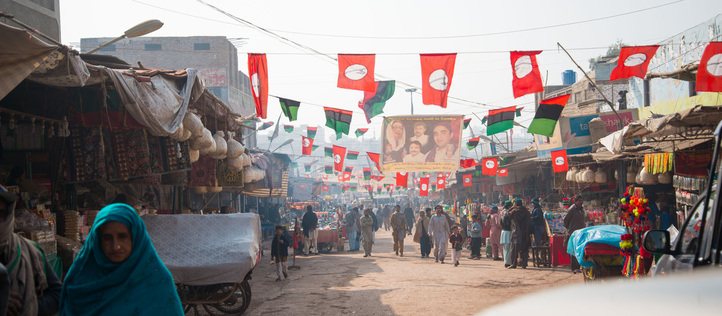
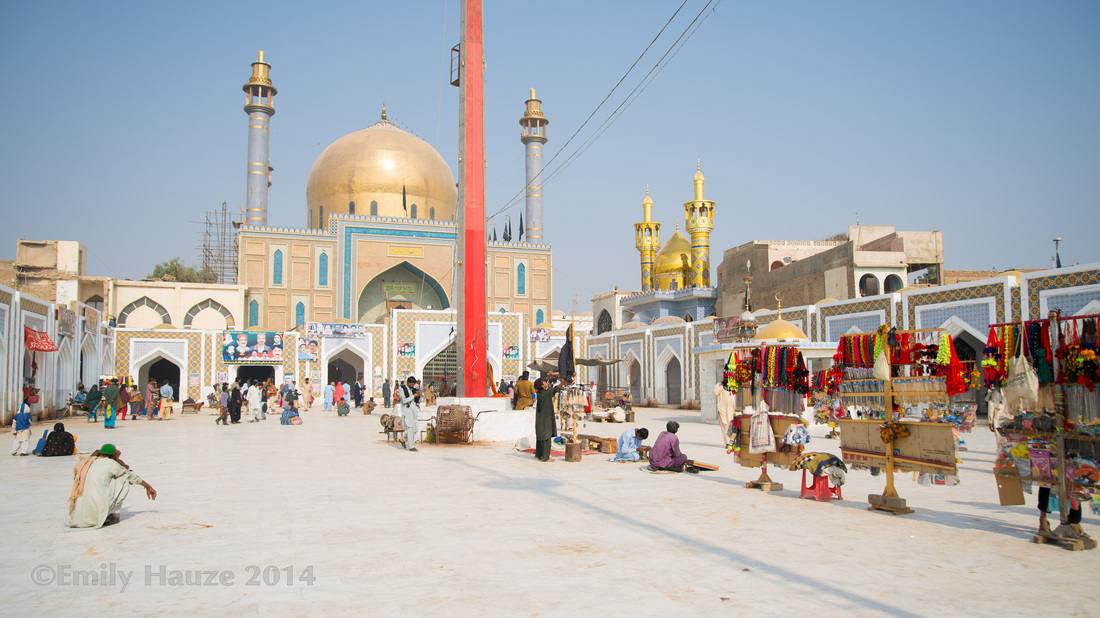
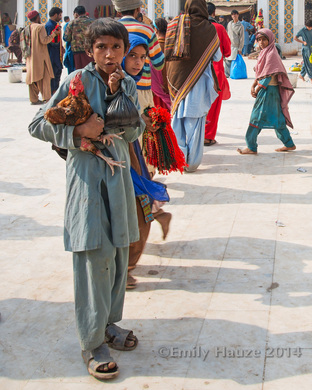
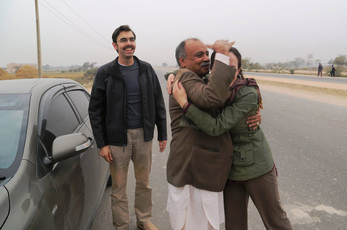
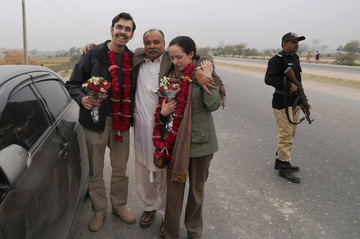
 RSS Feed
RSS Feed
